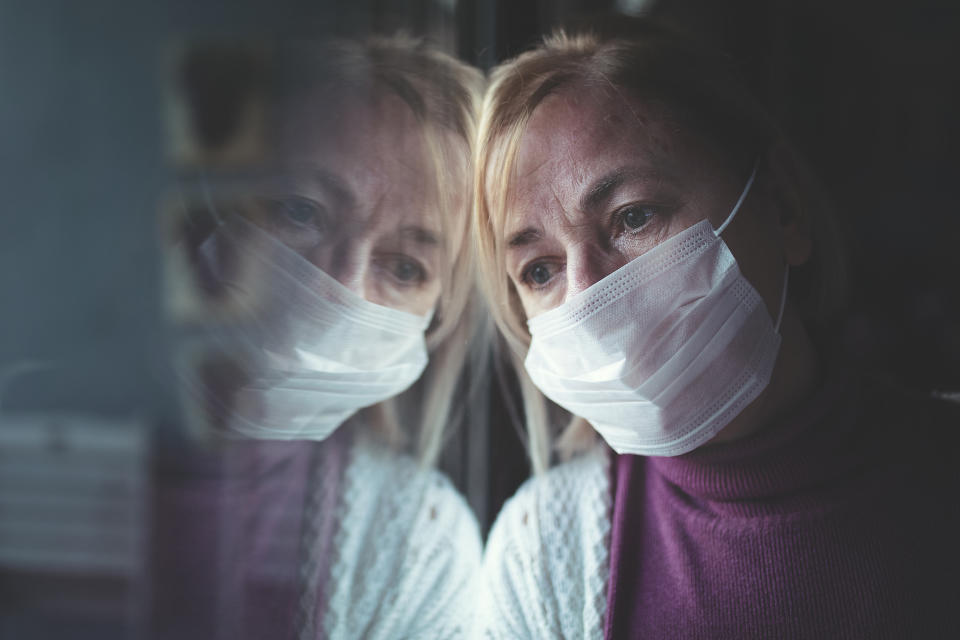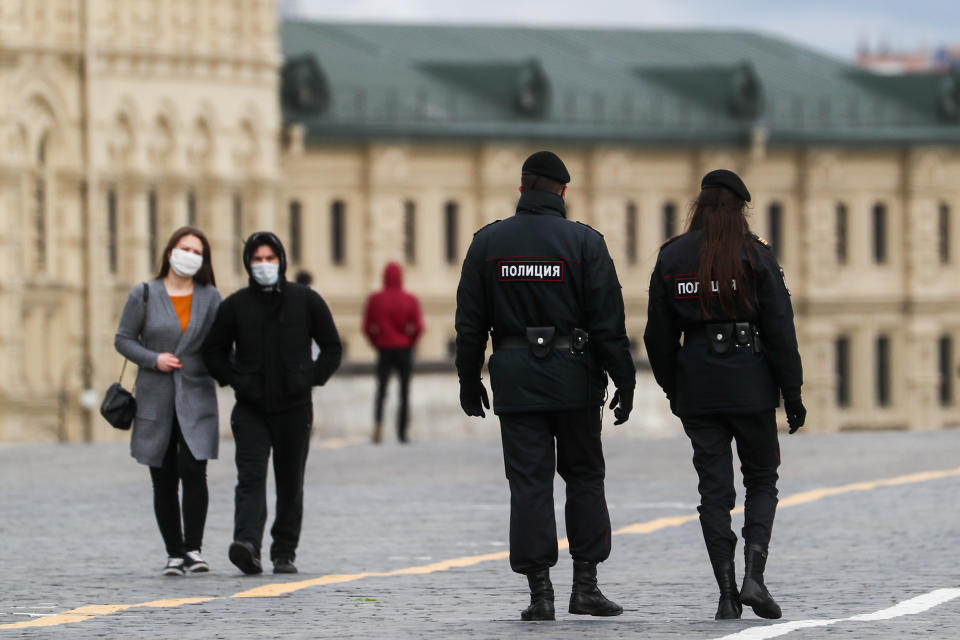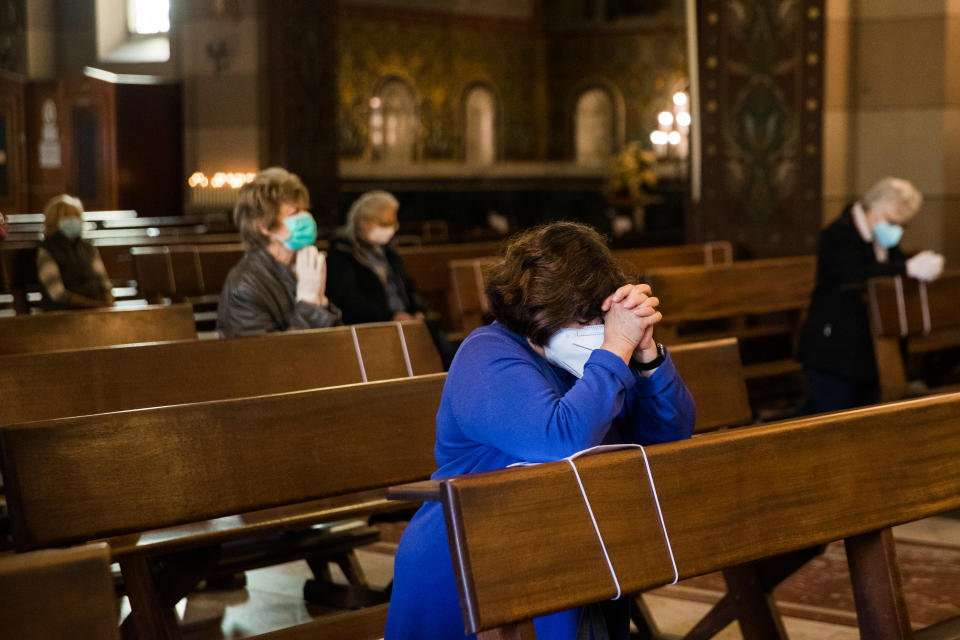Coronavirus survivors may suffer delirium and PTSD, experts warn
People who survive a severe coronavirus infection may experience delirium or post-traumatic stress disorder (PTSD), research suggests.
The circulating pathogen is one of seven strains of a virus class that are known to infect humans.
Others include severe acute respiratory syndrome (Sars) – which killed 774 people during its 2002/3 outbreak, and Middle East respiratory syndrome (Mers) – which resulted in 854 fatalities in 2012.
After looking at people hospitalised with different coronavirus strains, scientists from University College London (UCL) concluded a quarter of people in hospital during the ongoing pandemic may have delirium.
While the long-term effects of the circulating strain are unknown, nearly a third of people admitted to hospital with Sars or Mers went on to develop PTSD.

Early research suggests four out of five people who catch the current coronavirus experience mild symptoms, although it can trigger a respiratory disease called COVID-19.
Coronavirus ‘can be a very unsettling experience for anyone’
“Most people with COVID-19 will not develop any mental health problems, even among those with severe cases requiring hospitalisation, but given the huge numbers of people getting sick, the global impact on mental health could be considerable,” said co-lead author Dr Jonathan Rogers.
“Our analysis focuses on potential mental health risks of being hospitalised with a coronavirus infection, and how psychiatric conditions could worsen the prognosis or hold people back from returning to their normal lives after recovering.”
Latest coronavirus news, updates and advice
Live: Follow all the latest updates from the UK and around the world
Fact-checker: The number of COVID-19 cases in your local area
Explained: Symptoms, latest advice and how it compares to the flu
Delirium, described as a “serious disturbance in mental abilities that results in confused thinking and reduced awareness”, has been linked to longer hospital stays and an increased risk of premature death.
To learn more, the UCL scientists analysed 72 studies carried out amid the Sars, Mers and COVID-19 outbreaks.
The coronavirus that causes COVID-19 is said to be more than 79% genetically similar to Sars and over 50% so to Mers.
Sixty-five of the studies had been peer-reviewed, which involves non-biased experts weighing in on the research’s strengths and weaknesses. Seven papers were released preliminarily.
In total, the review was made up of 3,500 patients hospitalised with a coronavirus.
Milder or asymptomatic cases were not included.
Results – published in The Lancet Psychiatry – revealed almost a third of the patients hospitalised with Sars or Mers went on to develop PTSD, with an average follow-up of nearly three years.
Those with ongoing physical health problems were more at risk.
Rates of depression and anxiety were also high, with around 15% of patients suffering a year after overcoming the illness.
A further 15% experienced symptoms of depression and anxiety without an official diagnosis.
An additional 15% suffered chronic fatigue, mood swings, insomnia or impaired concentration and memory.
While in hospital, almost a third (28%) of people hospitalised for Sars or Mers experienced confusion.
Early evidence from the ongoing pandemic suggests delirium could be similarly common in COVID-19, according to the UCL scientists.
They also found preliminary evidence that delirium may have been associated with a higher risk of death during the Mers outbreak.
Overall, poor mental health was found to be more common among the patients who worried about their illness.
Those who recovered well physically were less at risk.
“It is likely that severe COVID-19 infections will have similar rates of PTSD to Sars and Mers,” said Professor Tom Dening, from the University of Nottingham.
“This is entirely understandable when one considers how terrifying the experience must be; extreme breathlessness and a sense that one may be about to die, or becoming increasingly breathless and in dread of needing to be ventilated.
“Plus the effects of being in a strange environment in an intensive care unit attended by masked and gowned staff.
“PTSD is even more likely to occur in patients who have been placed into induced coma and ventilated, since they will have a long gap in their experience that they will be unable to recover.
“This can be a very unsettling experience for anyone.”
Social isolation, stigma and concern about infecting others may trigger mental health problems in COVID-19 patients, warned the UCL scientists.
The virus itself, or the immune response it triggers, may also impact the central nervous system.
“We know very little, almost nothing, about how this virus could affect the brain,” Professor Ed Bullmore, from the University of Cambridge previously said.
He referenced the now official symptom of a loss of taste or smell.
“Neurological symptoms like fatigue suggest the brain may be involved,” added Professor Bullmore.
While it may sound far-fetched, the Spanish flu pandemic of 1918/19 was linked to a spike in Parkinson’s disease after the virus triggered degeneration of nerve cells.
Professor Gitte Moos Knudsen, from Copenhagen University, referenced a rat study where the rodents showed depression-like behaviours after losing their taste and smell.
The UCL scientists also found healthcare staff were more likely to suffer mental health problems than other workers.
UK officials have said the emotional wellbeing of frontline healthcare staff may be affected by the outbreak, with NHS England launching a dedicated mental-health support line for its workers last month.

‘COVID-19 survivors return to a society in deep economic crisis’
The UCL scientists noted 65 out of the total 72 studies were “low or medium quality”.
“It is likely the apparently high rates of anxiety disorders, depression, and PTSD seen in Sars and Mers patients overestimate the actual burden”, said Dr Chesney.
“The lack of adequate comparison groups or assessment of patients’ previous psychiatric history means it is hard to separate the effects of coronavirus infections from pre-existing conditions, the impact of an epidemic on the population as a whole or that selection bias led to high prevalence figures”.
Writing in a linked comment, a team from University Medical Centre Utrecht in the Netherlands added: “Findings from previous coronavirus outbreaks are useful, but might not be exact predictors of prevalences of psychiatric complications for patients with COVID-19.
“The warning that we should prepare to treat large numbers patients with COVID-19 who go on to develop delirium, post-traumatic stress disorder, anxiety and depression is an important message for the psychiatric community”.
Scientists have previously warned the coronavirus pandemic could have a “profound” and “pervasive” impact on people’s mental health.
The Dutch team added that “treatment of patients admitted to hospital for [the current coronavirus] seems to be different from treatment of those admitted for Sars and Mers infections.
“Furthermore, the social situation to which COVID-19 survivors return is completely different from that of Sars and Mers survivors.
“COVID-19 survivors return to a society in deep economic crisis, with shortage of basic needs such as food in some countries and other countries still in lockdown, and enforcing physical isolation.
“These social adversities will keep stress levels after somatic recovery high, and further increase patients’ risk for long-term psychiatric complications such as anxiety and depression.”
Professor Dame Til Wykes, from King’s College London, agreed, but added “the fact we are ‘all in this together’ may provide community support which can lessen the psychiatric effects”.

What is the coronavirus?
Since the coronavirus outbreak was identified, more than 4.7 million cases have been confirmed worldwide, according to Johns Hopkins University.
Of these cases, over 1.7 million are known to have “recovered”.
Globally, the death toll has exceeded 315,000.
The coronavirus mainly spreads face to face via infected droplets expelled in a cough or sneeze.
There is also evidence it is transmitted in faeces and can survive on surfaces.
Symptoms include fever, cough and slight breathlessness.
The coronavirus has no “set” treatment, with most patients naturally fighting off the infection.
Those requiring hospitalisation are given “supportive care”, like ventilation, while their immune system gets to work.
Officials urge people ward off infection by washing their hands regularly and maintaining social distancing.




